
In honor of what would have been my grandfather's 89th birthday this coming Thursday, my family and I are having a casual barbeque on Saturday. The last time we had a backyard cookout for my grampa was in 2005. I didn't know that that would be the last birthday party I would be able to throw for him, the last chance to make him a cake. On April 1 of this year, he died. I am incredibly grateful that I was able to be with him throughout his hospitalization with heart disease and during his actual very last breaths. I am very grateful that Brian and my closest friends were all there for me and my grandfather throughout those trials too. I seem to be more prone to crying now than in the first few weeks after his death. The fact that his birthday is three days away, that it will be the first time in my life I don't get to buy him a card and wish him a happy birthday hasn't entirely hit me. Still, it seems fitting to get together to eat and share time with my loved ones in his memory.
The greatest mark of my grandfather's illness to me wasn't so much his actual hospitalization or even the two known heart attacks he suffered. It was his drastic weight loss and muscle wasting. It was the fact that he stopped eating, stopped getting hungry, stopped being able to taste and enjoy food. That to me seemed the cruelest blow of all. I'd seen him in the hospital before and his heart failure and hypertension had become a part of him that had, for years, been so seemingly well-managed by medication that they became almost incidental. Surmountable, even. But not eating? He loved to eat. That was taken away from him.
As a former cook in the army, he also knew how to cook. As the years went on, his concoctions became questionable, and often unrecognizable as any familiar food item, but I remember his pizza, fried fish, coconut ice cubes. My grandmother, however, loomed larger in the shaping of my food history. She was one of Those grandmothers, the kind who baked delicious cakes without ever referring to a recipe. When I wanted a snack, she'd make me fried chicken. She got me to eat beans--a hated food as a child--with her arroz con gandules, which I nicknamed vitamin rice because the pigeon peas looked like little pills. But the remeberance of my grandmother is more like myth. Maybe she did use recipes and measuring cups but I just don't remember. My grandfather, though, was real. I watched him cook everyday for years (and then I watched him stop cooking). I watched him read the greasy Betty Crocker cookbook when he was bored and then, hours later, he would have made a pear upside down cake. My grandfather didn't care if he didn't have half the ingredients called for. He'd just make whatever. So pineapple turned to pear and sometimes he wouldn't even use flour. Not if he had Bisquick or corn meal instead.
Earlier this year, to watch him turn away from food when I had always watched him turn towards it--first by feeding me, then by feeding my grandmother when she stopped cooking a few years before she died, and then finally for our dog, who he always cooked for--was so frustrating and incomprehensible. I didn't understand. I just thought if we could make him eat, he'd come back home. He's so weak and skinny, he's not rebounding, that's what I heard. So, I'll just make him eat. I made him coconut rice pudding, bought him soup and cakes. All I had to do was bring food, make him eat it, and he would get better. But he never wanted to eat. The biggest conflicts in the hospital were about getting him to eat. Every day my mother, the nurses and doctors, and I would try, tell him why he needed to eat. He would just get so angry. I suppose the only thing worse than losing the will to eat is having everyone bug you about why you should eat. In fact, my last interaction with my grandfather before he really started dying was me finally getting him to drink some Gatorade and bickering over the jello cup he didn't want.
Despite all of that, it doesn't seem strange at all to eat in his honor. He spent most of his life doing it anyway. The one feature, no matter one's religion or background, that seems to be common after any death is the bringing of food from friends and neighbors. You eat after someone dies. Or else someone tries to get you to eat. I guess there are two ways to grieve: eat or don't eat. I eat. The first thing I wanted to read after my grandfather died was the introduction to the "Funeral" chapter in Nigella Lawson's
Feast. And the first thing I wanted to make was the marble cake in that chapter. Baking tied and ties me to my grandparents. It may seem cruel, or at least like some kind of denial, to bake a cake and eat it after someone dies. Yet food is what keeps everyone going. How can you go on after someone you love has died is the question Lawson brings up in the chapter. But that's what death is. It's not just someone dying and leaving you. It's you having to keep going on without them.
Yesterday, Brian called me while I was at Wegman's, shopping for the week and picking up a few items for the barbeque. I told him about my friend's husband who only eats halal meat so I'll have to get fish for him (and me). And no pork in the arroz con gandules so Brian and the Guls, who are Muslim, and I can eat it. Let's try not to mix up the ribs with the veggie dogs when grilling. Oh, and do you want me to make grilled eggplant sandwiches with vegan red pepper aioli? You know, a break from Morningstar Farms? Brian laughed as I told him all of this, saying it really was a mutual menu and how our conversation should be my next post. When I started writing, I didn't anticipate getting into so much detail about my grandfather and death in general and how all of that is so tied to food (everything is tied to food for me). But I guess I just really needed to talk about all of that.
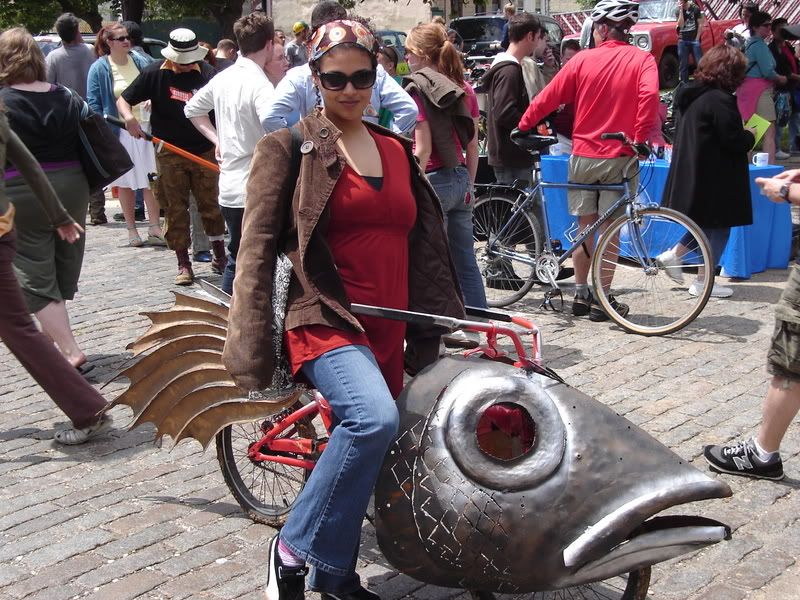 Me at my most pescetarian. Trenton Ave. Arts Festival, Philly, PA.
Me at my most pescetarian. Trenton Ave. Arts Festival, Philly, PA.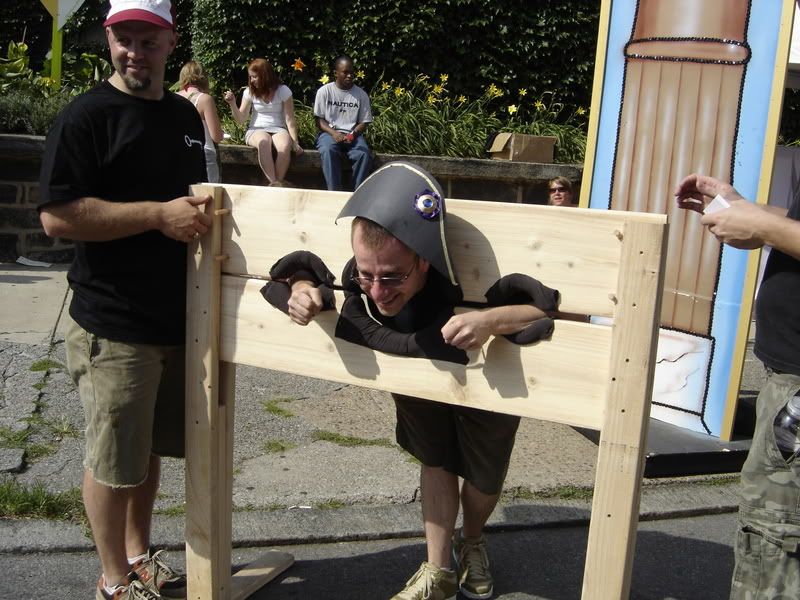 I'm not always so sweet to Brian, despite the supposed "lovefest." Bastille Day, Philly, PA.
I'm not always so sweet to Brian, despite the supposed "lovefest." Bastille Day, Philly, PA. Marie Antoinette didn't throw down cake or Philly's own Tastykakes at the peasants on Bastille Day. She and her minions threw Twinkies. And if there's anything worse than eating Twinkies, it's having your chest pelted with them 5 or 6 times in a row.
Marie Antoinette didn't throw down cake or Philly's own Tastykakes at the peasants on Bastille Day. She and her minions threw Twinkies. And if there's anything worse than eating Twinkies, it's having your chest pelted with them 5 or 6 times in a row.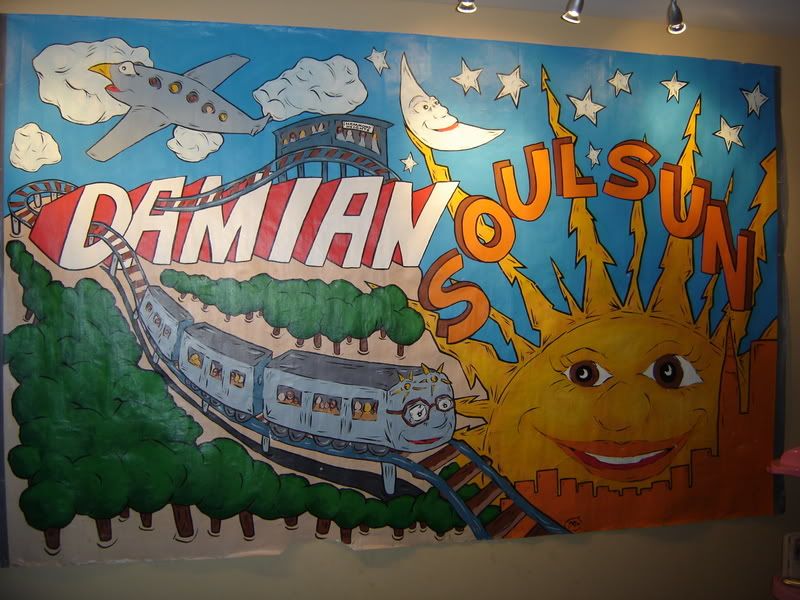 Brian made that. Yeah. I was impressed too. Friend's house, Philly, PA.
Brian made that. Yeah. I was impressed too. Friend's house, Philly, PA.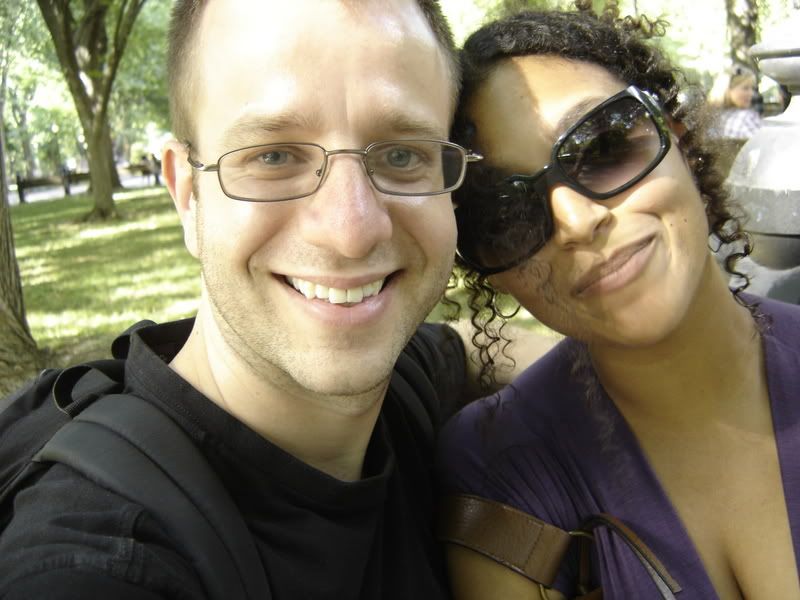 Central Park, NYC, waiting to see Neko Case.
Central Park, NYC, waiting to see Neko Case.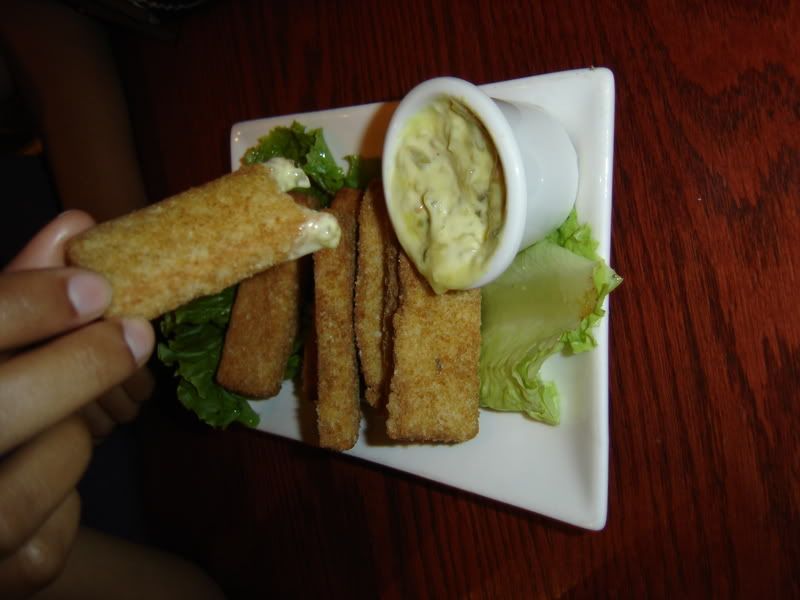 After Neko, we headed over to Red Bamboo for a late-night fried vegan fest, which included fake fish sticks and tartar sauce and some scarily (and yummily) authentic-tasting fried fake chicken breast, which is in the sandwich below.
After Neko, we headed over to Red Bamboo for a late-night fried vegan fest, which included fake fish sticks and tartar sauce and some scarily (and yummily) authentic-tasting fried fake chicken breast, which is in the sandwich below.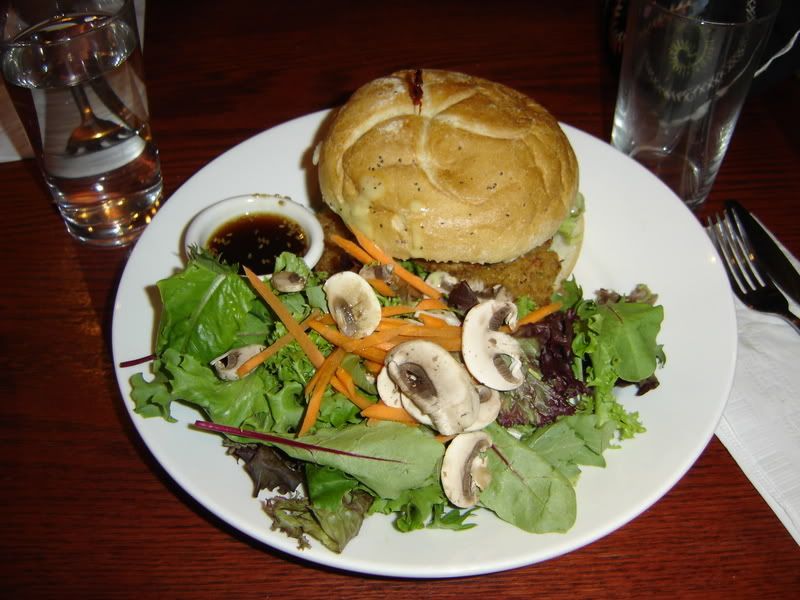
 I find happiness in the
I find happiness in the 



